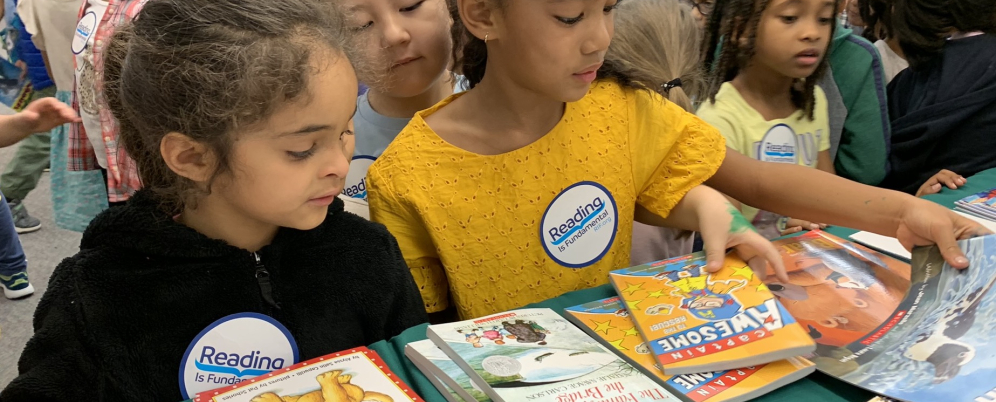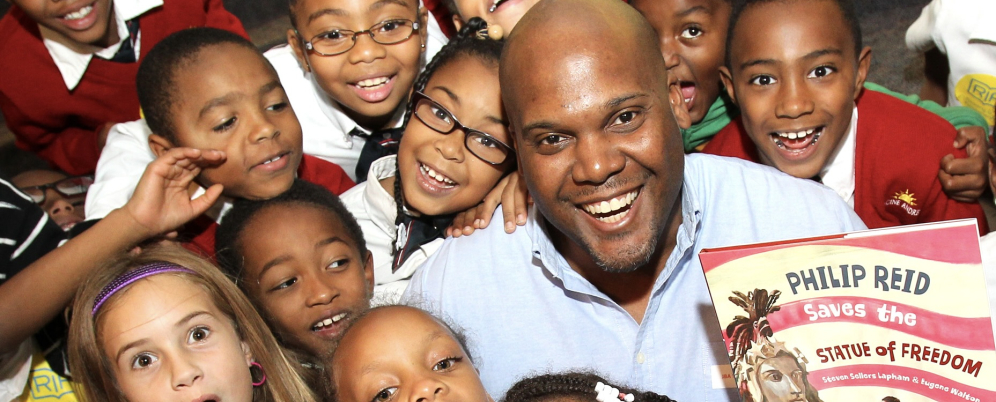How Reading Improves the Health of Kids and Adults Alike
by Ally Bush
Aligning with Reading Is Fundamental’s (RIF) January Rally to Read theme of “wellness,” our friends at Reading Partners explore the undeniable benefits reading can have on the health of both children and adults. Read on to learn from Ally Bush, the Manager of Inbound Marketing at Reading Partners, as she outlines ways that readers of all ages can improve their well-being through the pages of a good book, independently or together. Find additional free resources to supplement reading comprehension and enjoyment, available on Literacy Central, and visit our Rally to Read page for read-alouds and other thematic fun.

You know the saying: “A book a day keeps the doctor away.” Well, that’s not quite what people say, but reading is incredibly good for you! Not only is it a fun pastime, an opportunity to learn, and good practice for kids working to boost their literacy skills, but reading can actually improve the health of kids and adults alike.
Kids’ Health
With their malleable brains ready to absorb new information, kids see both mental and physical benefits from reading. In a study published by Greater Good, researchers found that children who read for pleasure see improved cognition and fewer mental health problems. Reading at an early age is essential for brain development, boosting cognition skills, retaining information, and providing resilience in times of stress.
When kids unlock the skill of resilience, their overall mental well-being strengthens. In fact, children who can’t read proficiently “frequently face higher rates of anxiety and depression.”
Linda Mayes, a professor at the Yale Child Study Center, even says that bibliotherapy, the act of reading as therapy, may be as effective as cognitive behavioral therapy for children who have anxiety disorders. Since cognitive behavioral therapy is currently one of the leading treatments for anxiety, this is a huge finding and one that has major implications for kids of any age who find themselves dealing with anxious feelings.
Young readers are also better able to perform executive functions such as remembering, planning, and practicing self-control, while tending to have higher social intelligence.
Children Rising also finds physical benefits to reading when you’re young, stating “Just 30 minutes of reading a day can lead to measurable improvements in physical health, including reductions in systolic blood pressure, diastolic blood pressure, and heart rate.”
It’s clear that reading is the key to unlocking childhood wellness, and with public libraries and so many ways to get free or cheap books, it’s an incredibly accessible way to get there!
Adults’ Health
When we’re young, our developing brains absorb the benefits of reading as quickly as we can devour a page-turner book. But what happens when we grow up and our brains are more set in their ways? Reading has ample benefits for adults as well.
Even after your frontal lobe develops, reading can still improve your physical and mental health.
Using an MRI, researchers discovered that when we read we’re stimulating our brain’s neural pathways, which enhances our brain activity, memory, cognitive function, creativity, and capacity to learn.
On the physical side, adults enjoy some of the same benefits that kids do. According to Nuance Health, “Research shows that regular reading can lower blood pressure, reduce stress and improve sleep quality. Researchers have also found a link between reading books and longevity; reading keeps your brain active and promotes mental and emotional fitness.” When reading can literally extend your lifespan, it’s a wonder we don’t all have our noses stuck in a book every day!
An added benefit of strong literacy skills in adulthood is the ability to read and understand other aspects of our health. If we can’t read our healthcare plans, doctor’s recommendations, or information about conditions impacting our lives, we’re at a severe disadvantage. Literacy not only improves adult health; it empowers us to make informed decisions about our healthcare needs.
Collective Health
Separately, reading can improve the health of kids and adults alike. But something magical happens when they read together.
When parents and caregivers read with their kids, they have the chance to spend meaningful time with an adult role model, which has an abundance of benefits for their development. According to the LA Times, “Reading with caregivers nurtures bonding and secure attachment, which are fundamental for healthy development. The shared experience of reading promotes feelings of safety, trust, and connection.” It can also lead to greater feelings of empathy among both reading partners, as well as expanded worldviews.
Typically, reading together also involves reading aloud, which has a unique benefit for children. Mana Medical Associatesfinds that children need a ton of exposure to language in order to develop their speech skills. While overhearing and participating in ordinary conversations is important, “reading together can introduce kids to words they otherwise might not have heard. Books may also include language structures that don’t come up as often in ordinary speech.”
Read, read, read!
If your New Year’s resolution was to work on your health, add reading to your to-do list. The benefits, for both children and adults, are too beneficial to ignore, especially if you’re an adult reading with a child.
Another way you can improve your health, which also involves reading, is by volunteering with Reading Partners. Volunteering your time is known to improve your health and wellness, and the national literacy nonprofit is always looking for more literacy tutors. Check out their website to view in-person and online volunteer opportunities.

